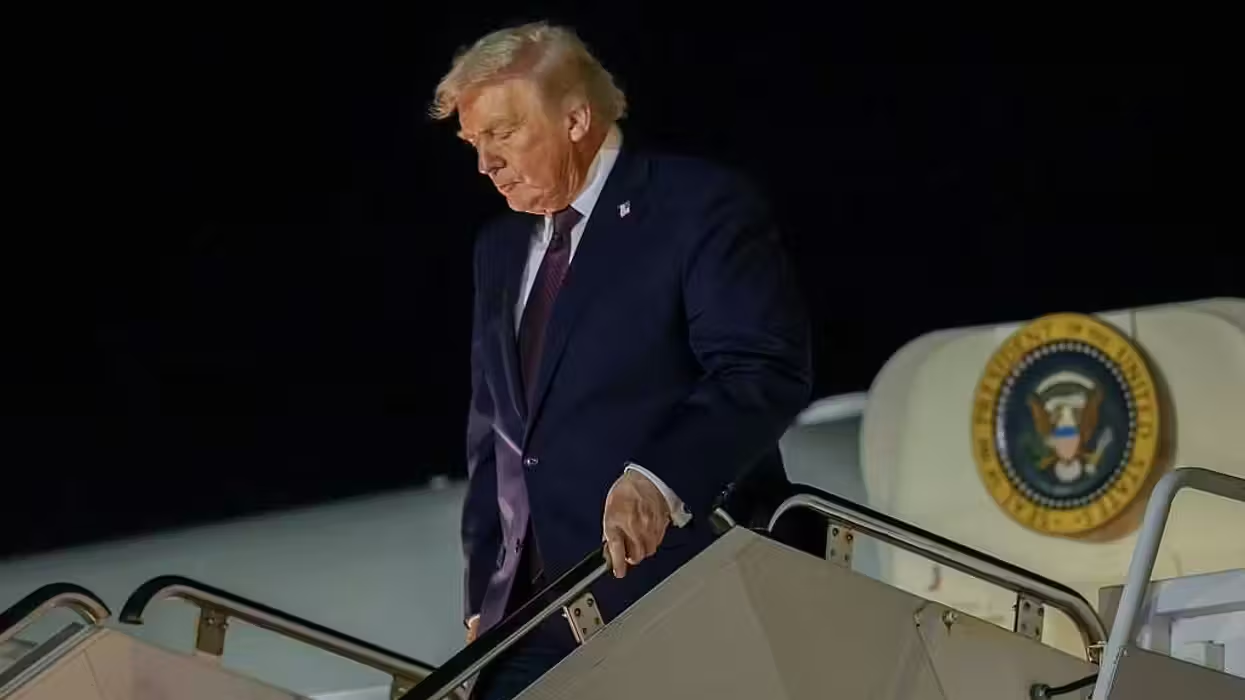The leader of Hamas says his organization will not give up terrorism against Israel even if it forges ahead with plans to join the Palestinian Authority government that would for the first time in years create a single authority to rule in both Gaza and the parts of the West Bank not controlled by Israel.
Local media reports suggest a unity government deal that would seat Hamas alongside the PLO’s Fatah faction and that could be announced as early as Tuesday, a move that would place in jeopardy the more than $400 million in direct annual U.S. aid to the Palestinians, according to members of Congress and Middle East analysts.
"We will not give up the weapon of resistance, and we will not forsake resistance," Hamas’ Prime Minister in Gaza Ismail Haniyeh said on Thursday.
Hamas “will not depart the position of manliness and dignity and will remain loyal soldiers of Palestine,” Haniyeh added.
 Senior Fatah official Azzam al-Ahmad, left, Gaza's Hamas Prime Minister Ismail Haniyeh, center, and senior Hamas leader Moussa Abu Marzouk, who is based in Egypt, after the announcement of an agreement between the two rival Palestinian groups, Hamas and Fatah, at Haniyeh's residence in Shati Refugee Camp, Gaza Strip, Wednesday, April 23, 2014. (AP Photo/Adel Hana)
Senior Fatah official Azzam al-Ahmad, left, Gaza's Hamas Prime Minister Ismail Haniyeh, center, and senior Hamas leader Moussa Abu Marzouk, who is based in Egypt, after the announcement of an agreement between the two rival Palestinian groups, Hamas and Fatah, at Haniyeh's residence in Shati Refugee Camp, Gaza Strip, Wednesday, April 23, 2014. (AP Photo/Adel Hana)
According to the independent Palestinian news agency Ma’an, Haniyeh announced that a key stumbling block in negotiations with Fatah had been overcome -- that is, uniting Hamas and Palestinian Authority security forces. More than 600 Palestinians were killed in ferocious battles between the two factions in Gaza in 2006 and 2007 which eventually led to the Hamas takeover of the Mediterranean seaside strip.
"We will not allow the return of security disorder to the Gaza Strip," Haniyeh said.
Jerusalem Post Arab Affairs correspondent Khaled Abu Toameh noted an article in the Arabic press reporting that Hamas co-founder Mahmoud al-Zahar said that the unity deal would allow the terror group to expand its “resistance” to include not only Gaza, but also the West Bank. “Resistance” being the word commonly used by Palestinians to refer to armed acts, this expansion of activity is likely to raise alarm bells for Israel, whose troops are already deployed in southern Israel to combat Hamas and Islamic Jihad rockets attacks on Israeli cities.
The website The Tower, which covers the Middle East, pointed out that this Hamas-Fatah military merger “would see the American-designated terror group avail itself of American resources originally given to the PA [Palestinian Authority].”
It is also unclear how Hamas-linked Palestinian security officers would cooperate with Israel Defense Forces (IDF) troops in the context of ongoing security coordination agreements forged during the 1993 Oslo Peace Accords.
Hamas is designated by the State Department as a foreign terrorist organization, and, therefore, if it is brought into the government, the tap of U.S. aid to the Palestinian Authority would by law have to be turned off, a U.S. lawmaker says.
Rep. Ileana Ros-Lehtinen (R-FL), who chairs the House Foreign Affairs Subcommittee on Middle East and North Africa said at a May 8 hearing that the 2006 Palestinian Anti-Terrorism Act "prohibits U.S. assistance to a Palestinian government that would have any members of Hamas amongst its ranks. Should reconciliation happen and Hamas becomes a part of the Palestinian government, I fully expect Secretary [of State John] Kerry and the Administration to enforce the letter of the law.”
“U.S. law is clear on the prohibition of U.S. assistance to a unity Palestinian government that includes Hamas, a designated Foreign Terrorist Organization, and President Obama must not allow one cent of American taxpayer money to help fund this terrorist group,” she said on another occasion.
The Obama administration is currently seeking more than $440 million in direct aid to the Palestinian Authority for the 2015 budget year. The U.S. additionally gives some $600 million to the UN agency UNRWA which goes to Palestinians classified by the UN as “refugees” in the West Bank and Gaza.
Ros-Lehtinen further blamed Kerry’s recently failed effort at forging an Israeli-Palestinian peace agreement for fanning “the flames” and an impetus that sent Palestinian President Mahmoud Abbas into the arms of Hamas.
“We have a peace process that fell apart, yielding no positive results, leaving both parties with an even greater distrust of one another. In fact, the legacy of this failed round of talks could be that it ended up causing more harm than good, as it seems to have moved Fatah and Hamas closer to reconciliation,” she added.
For its part, the Obama administration has not said if it is prepared to work with a unity government.
Asked about the reportedly imminent deal, State Department Spokeswoman Jen Psaki said on Monday, “Our position as the United States Government has been consistent about the steps that any government would need to take.”
However, Israel Radio on Sunday quoted a senior Israeli official who said that the Middle East Quartet – the group of nations which mediates the Israeli-Palestinian peace process - would recognize the new Palestinian government as long as Hamas members were not appointed cabinet ministers. TheBlaze is unable to confirm the report. The U.S. is one of the four members that comprise the Quartet.
Palestinian Authority President Mahmoud Abbas has said that the unity government would renounce violence and abide by past agreements with Israel.
Under the Fatah-Hamas deal, an interim government made up of “technocrats,” led by Abbas, would be followed by elections.
A former Treasury Department terrorism finance analyst said that given the administration’s history of working to maintain aid to the Palestinian Authority even while it continued to fund salaries to convicted terrorists, the U.S. may try to find a way to preserve the funding, at least in the interim period.
“There is a lot of activity happening on Capitol Hill right now with members of Congress seeking to determine what prompts a full cut in assistance to the Palestinian Authority. At least for now, we’re seeing proponents of the Palestinian Authority insisting that the creation of a so-called technocratic government or interim government would not trigger such a cut,” Jonathan Schanzer of the Foundation for Defense of Democracies, a Washington-based research organization, told TheBlaze.
“Because they [Hamas members] haven’t changed their take on violence, they haven’t renounced violence, their mere presence in a unity government could potentially prompt a full cut in aid,” said Schanzer who recently authored the book “State of Failure: Yasser Arafat, Mahmoud Abbas, and the Unmaking of the Palestinian State.”
Notably, Schanzer also pointed out that it’s unclear what Israel will do about the funding it provides to the Palestinian Authority. Because Israel has a vested interest in the Palestinian Authority running day-to-day affairs in the areas it controls, it’s not at all clear if the taxes Israel collects for the PA will be withheld as a punitive measure.

 Senior Fatah official Azzam al-Ahmad, left, Gaza's Hamas Prime Minister Ismail Haniyeh, center, and senior Hamas leader Moussa Abu Marzouk, who is based in Egypt, after the announcement of an agreement between the two rival Palestinian groups, Hamas and Fatah, at Haniyeh's residence in Shati Refugee Camp, Gaza Strip, Wednesday, April 23, 2014. (AP Photo/Adel Hana)
Senior Fatah official Azzam al-Ahmad, left, Gaza's Hamas Prime Minister Ismail Haniyeh, center, and senior Hamas leader Moussa Abu Marzouk, who is based in Egypt, after the announcement of an agreement between the two rival Palestinian groups, Hamas and Fatah, at Haniyeh's residence in Shati Refugee Camp, Gaza Strip, Wednesday, April 23, 2014. (AP Photo/Adel Hana)






